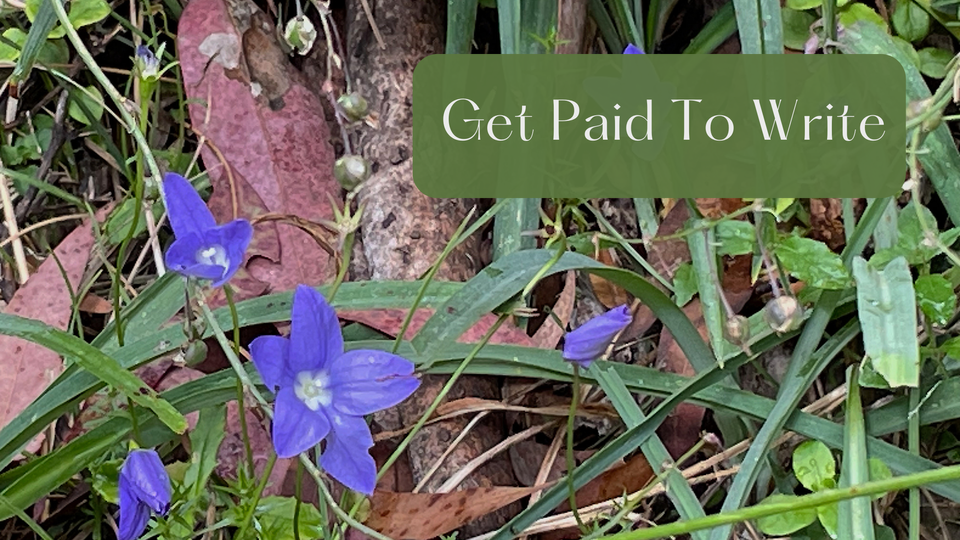How to Get Started as a Freelance Writer

You say you want to get paid to write? That’s great! Many, many people have made long-lasting careers out of being paid writers.
But one of the most common problems that beginning writers struggle with is not knowing what you have to do to get started. And especially not knowing the intricate details of who and where to offer your services.
There is so much conflicting advice out there. And even when the advice seems clear, what you’re supposed to do with it can feel as obvious as a bunch of jigsaw puzzle pieces with no picture attached.
It’s confusing!
For example, when I was getting started as a paid writer, the advice was to “always be pitching” or that I should “send out lots of LOIs”.
And I’d think “what? What does that even mean? How do I do that!"
It took a bit of time and asking questions to figure out what all the acronyms mean and what to do to get paid writing work. Time that I don’t want you to have to waste.
So this post is going to lay out step by step what you need to do to get your first paid writing gig. And along the way, I will demystify some of the language that the paid writing community uses to talk about what it does.
So what does it mean to get paid to write?
Technically, it means someone pays you to put words together in whatever way they require to suit their particular goals.
In reality there are so, so many ways you can get paid for your ability to coherently string together words in a sentence. And asking which way is the best way to earn money for writing is like asking “how long is a piece of string”.
“How long is a piece of string?” is a phrase I learned in New Zealand. And it means that the answer to the question you just asked is … it all depends.
You can get paid for marketing or copywriting. You could be a scientist writing research papers as part of your academic work. Or you could be a scriptwriter for YouTube videos, tv series, podcast episodes.
The list of possible kinds of writing is longer than the line to buy an ice cream cone on a hot summer’s day.
And to make everything more complicated, there’s the terms of the type of agreement governing your work. You can write as an employee or a subcontractor or a freelancer.
So for the sake of brevity (and clarity) I’m going to focus on the steps you need to take to prove you can write. And then I’ll talk about the things you need to do to find paid writing opportunities, whether you’re working for yourself or someone else.
And remember that those paid writing opportunities can be very different. It could mean writing as part of your job, getting writing work as a subcontractor or pitching publications (or businesses) with ideas you’ve come up with.
And those ideas could be really different to what you might expect.
Recently my husband and I bought a Murphy bed, which folds up against the wall when not in use and disguises itself as a cupboard.
We put that Murphy bed together ourselves. And we’re usually pretty good with the handyman skills.
But the instruction manual that came with the bed was woefully lacking in every possible way. Bits that were important got left out. Bits that WERE there were misleading or downright confusing. The drawings weren’t the same as what we were seeing laid out in front of us and….. My grump list goes on and on and on.
The point is, really good instruction manuals are worth their weight in gold. And it’s not usually publications asking for that kind of writing. It’s businesses who sell things requiring some assembly. Or who need safety manuals to go with products that are already assembled.
And someone who is good at explaining things step-by-step to people (even if they have four thumbs) will shine in this space.
Figuring Out What You Want And What You Can Do
There are some big differences between holding down a job that pays you to write and being your own boss. Where you’re out there every day coming up with ideas and asking editors if they are interested in those ideas.
Working as an employee can give you a bit of certainty when it comes to getting paid regularly. But it comes with a bunch of “gotchas”. Like inflexible working hours or limited holiday time, or having to work in-office. Or not being able to get time off to go see your child’s school play.
On the other hand, working for yourself as a freelancer or subcontractor, (usually) gives you more control over your schedule, BUT there’s no guarantee that the money will come in when you need it. It can often be “feast or famine”.
So the very first thing you need to do to get started as a paid writer is to go find a quiet place and answer these questions.
- Why do you want to write (and get paid for it)?
- What do you need to earn over the next few months in order to eat and pay the bills?
- What are your writing strengths? In other words, what are you interested in and what are you good at explaining?
- What expertise do you already have? For example, if you’re a scientist, what area of science could you cover? Or if you’re a student, what particular area of student life are you most familiar with?
- Will you be a generalist who creates blog content and product reviews and white papers and email newsletters and everything else under the sun? Or will you try to niche down as quickly as possible and focus on specific types of written content, topics or industries?
Once you’ve got some clarity around those questions, it’s time to hit your biggest challenge head on.

Building Your Writing Portfolio
One of the really tricky things about getting started as a paid writer is that people (editors) want proof that you’re a good writer and can give them what they need by way of words that entertain, engage, entice, energise or …. (take your pick of words starting in “e”).
And the inability to provide that proof, because of the lack of paid writing experience, is what stops most people in their tracks.
The conversation typically goes like this:
You: “Let me write for you.”
Editor: "Show me proof of your writing experience.”
You: "I don’t have any experience."
Editor: "Well get some and then come back."
You: "How do I get writing experience?!”
Editor: "Write for someone.”
But it doesn’t have to be like that.
I recently spoke with Lindy Alexander, an award-winning travel writer. And she made it really clear that you absolutely do NOT have to have paid writing experience in order to prove that you can write.
If you have an existing portfolio of your writing (old Medium posts, anyone?), you can point people to those. If you’ve been writing a blog, you can show them your blog posts, even if they are old.
And if you DON’T have an existing portfolio of your writing yet, then it’s time to set one up.
You can do that by starting your own personal blog or website.
Or you can write guest posts for other people’s websites. There’s lots of discussion as to whether you should do that for free or not. So I won’t get into that now.
Suffice it to say that there is a (limited) time and place for “free”. And there is a time when you should run away as fast as you can when someone wants you to write for no pay.
But I digress.
My last tip for building a portfolio from scratch is to create writing samples that sit on one or more of the big content platforms out there on the internet.
Some of the best places to do that are:
- LinkedIn posts and articles (see my blog post on how to set up your LinkedIn profile as a paid freelance writer)
- Medium, Beehiiv, or any of the other writing/newsletter platforms out there
- Reddit, Discord or other online group chat platforms
So, as soon as you've started building your writing portfolio and answered the key questions listed above, you'll have taken those first critical steps towards becoming a paid writer.
If you still have questions or need more clarity, I recommend that you check out these two courses, either of which will help fill in the details of how to quickly get started as a paid writer.
- Lindy Alexander’s Foundations of Freelance Writing (affiliate link). I’ve done this course and it’s very helpful.
- Kirsty Boden-Stuart’s The Complete Freelance Writing Online Course: Beginner To Pro. I’ve been through this course as well and it is also helpful
And next time, I’ll talk you through some of the things you need to know when it comes to setting up your freelance writing business.
Please note that as an Amazon Associate, we earn from qualifying purchases. That means that if you click on one of our affiliate links (these are clearly identified) then we will receive a small commission, for which we thank you. It helps us keep on providing informative posts that help you build your freelance writing career and business.






Member discussion